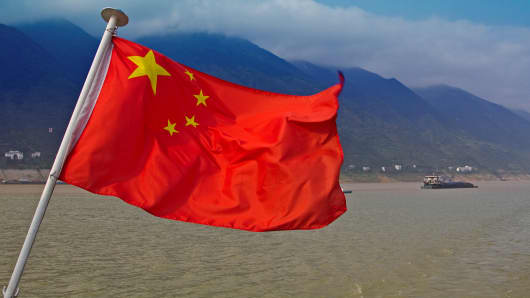|
|
|
|
|
Dhara Ranasinghe @DharaCNBC
CNBC.com

S. Goerner Moment Open Getty Images
Reports this week that Chinese fishing boats rammed and sank a Vietnamese fishing boat in the South China Sea have fueled concerns about geopolitical risk in Asia and the way Beijing responds to conflict in the region.
"It is difficult to understand how far this is going to go and it is clear that this type of thing has a negative impact, you don't get any prizes for that," said Bank of Singapore Chief Economist Richard Jerram.
"In general, you're probably not worried about deterioration but when you start to see a broadening pattern you start to wonder if there's a broader policy decision behind the events and I think that is happening," he added.
Read More › Hanoi says Chinese boat sinks Vietnamese vessel
This week's incident follows a similar one between a Chinese vessel and a Vietnamese ship in an area of the South China Sea claimed by Vietnam earlier this month near where China has deployed an oil rig. This month has also seen anti-Chinese riots in the Vietnam's southern industrial zones in reaction to the Chinese oil rig.
In addition to tension between Hanoi and Beijing, the past few weeks have seen tense relations between China and the Philippines with Beijing demanding the release of a fishing boat and crew seized by the Philippines in the South China Sea.
In fact, the past six months have seen a ramp up in geopolitical tensions in Asia, with Japan and China engaged in dispute in the East China Sea over islands, known as Senkaku in Japan and Diaoyu in China.
John Rutledge, chief investment strategist at Safanad in California, says China is dealing with differing pressures: the need to show a domestic audience that it is able to assert its voice in the world, a desire to show foreign leaders that it will be a responsible world leader, and a need to ensure China has adequate resources for its economic growth.
"The result of these conflicting pressures has been increasingly frequent confrontations between China and the U.S. (the recent hacking charges against the Chinese military, China's retaliation against U.S. IT tech companies), Japan (Diaoyu/Senkaku islands), and Vietnam (oil platform and riots in Vietnam)," he said. "I fear there will be more."
Colin Chapman, president of the Australian Institute of International Affairs in Sydney, says Beijing is probably paying close attention to how tensions between the West and Russia over Ukraine play out.
Russia annexed the Crimea peninsula earlier this year, triggering sanctions from the U.S. and Europe.
Speaking about the wider implications of the Ukraine crisis on CNBC earlier this week, he said: "The Chinese are watching what's happening in Ukraine since they are pushing and pushing and pushing in East Asia as we've seen."
Bank of Singapore's Jerram said the concern for businesses operating in Asia is what heightened tension between China and its neighbors means for the production chain.
Taiwanese firms, mistaken for Chinese-owned firms, appear to have borne the brunt of the violence during this month's anti-China riots in Vietnam.
"Even if you're relaxed about the possibility of people shooting each other, it's obviously a disincentive for companies to increase the vulnerability to regional production chains when this is going on," he said.
"The production chain has been an important factor in regional growth in the past 10-20 years, so anything that threatens to stop that or even reverse it is going to be quite a concern," he added.